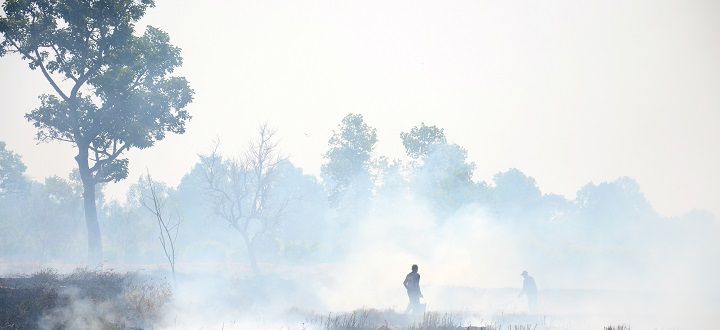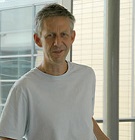The destructive power of a tiny wood-boring marine creature known as the gribble, has been harnessed by our biologists in a bid to tackle waste generated by rice farming.
In many regions of India and South East Asia, farmers burn the straw and husks left over after the rice harvest. In China alone it is estimated that 110 million tonnes of rice straw are burned each year, despite government rules prohibiting it. Burning straw contributes to the production of black carbon, a major driver of global climate change.
Now, research pioneered at York aims to find an alternative environmentally-friendly use for the straw by breaking it down and turning it into biofuel.
Professor McQueen-Mason gave a talk on his work at our research showcase YorkTalks 2016
Black carbon
“The current method of burning straw produces large quantities of smoke with negative consequences for human health, crop yield and global warming through the generation of black carbon in the atmosphere,” says Professor Simon McQueen-Mason, Director of our Centre for Novel Agricultural Products (CNAP).
“We live in a world affected by climate change and yet demand for energy is expected to increase by 50 per cent by 2030 and demand for food is expected to increase by a similar amount. At the same time the demand for water is expected to increase by 30 per cent,” he explains.
“High-level, multilateral agreements, such as the climate change agreement in Paris, set the global agenda for environmental issues. But what happens on the ground is also important.”
Enzyme
And here Professor McQueen-Mason and his team at CNAP have made an important breakthrough. Their discovery of a new enzyme – found in the gut of a wood-boring sea creature known as the gribble – could help turn straw waste into biofuel, reducing the need to burn it, while at the same time creating a carbon-neutral alternative to oil and gas.
The team are working with farmers and officials in Vietnam to develop a new strain of rice which generates straw that can be used for animal feed and is more readily converted into biofuel.
“Vietnam currently burns around 50 million tonnes of rice straw a year,” says Professor McQueen-Mason. “There are around 150 different rice varieties that we work with, and the straw they produce is often very different. Using our analytical skills at York we have been able to identify a strain of rice, the straw from which might be converted economically into biofuel. This could be a game changer in Asia.”
Biorefinery
With funding from the BBSRC, Professor McQueen-Mason took Dr Harry Vallack from the Stockholm Environment Institute (SEI) and other UK scientists out to Hanoi for an initial meeting with the Vietnam Academy of Agricultural Science where they talked about the possibility of using knowledge and expertise developed in the UK to help develop a cereal-based biorefinery.
The SEI had already been doing valuable work identifying the problem of black carbon pollution produced by stubble burning, which formed a key part of a United Nations initiative to find more environmentally friendly options.
“The conversations we were able to have between colleagues in different disciplines was key to getting this project off the ground,” says Professor McQueen-Mason. “It perfectly demonstrates the power of working collaboratively and how this can help all of us have a bigger impact on the grand challenges of our times.”
The text of this article is licensed under a Creative Commons Licence. You're free to republish it, as long as you link back to this page and credit us.





